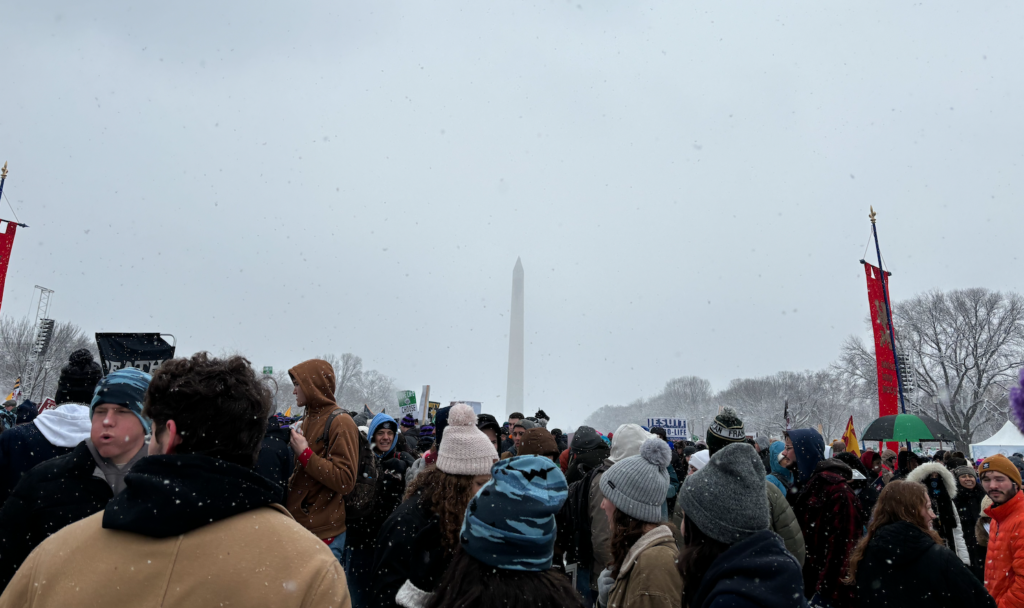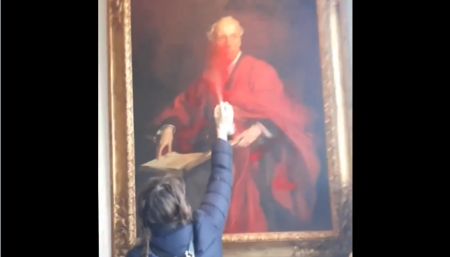On December 6, 2022, Isabel Vaughan-Spruce was arrested for silently praying outside an abortion clinic in the U.K. This was the first of two times she would be taken to prison for this “offense.”
After her second arrest in May of last year, she said, “This isn’t 1984, but 2023—I should never have been arrested or investigated simply for the thoughts I held in my own mind…. Silent prayer is never criminal.”
There are plenty of things to be said about the current state of affairs in America, but at least free expression isn’t completely dead (yet). As such, the 51st annual March for Life proceeded in full swing on January 19th, with its biggest adversary being the snowy weather. Plenty of pro-life events were slated for the weekend—receptions, conferences, even “parties for life.”
Some may wonder why it is even necessary to march anymore, since Roe v. Wade was overturned in 2022. Samuel Silvestro, a College of the Holy Cross senior marching with his school’s pro-life group, said, “I was motivated to march for life because I wanted to witness to the world that preborn lives are of equal dignity and worth to all other persons, and that they deserve equal protection under law from the moment of their conception.”
“It’s still important to march after Dobbs because Dobbs was just the beginning of a new chapter of this fight, we cannot stop marching until the unborn receive federal protection from the moment of conception,” he added.
A new chapter of this fight, indeed. Although Roe does not hold legal weight any longer, its precedent is still alive and well among all pro-choicers who are convinced that abortion is a human right. Completely dispelling that sentiment will probably take the next 51 years.
After the march, the Intercollegiate Studies Institute hosted a “March for Life Reception” at the Heritage Foundation. The event featured Alexandra DeSanctis and Tom Shakely as speakers. The two pro-life activists discussed the post-Dobbs future we are living in and how to best navigate a disappointingly pro-abortion world. They concluded that the pro-life cause did not end with the overturning of Roe v. Wade, and that the movement should now focus on establishing different ways to “make abortion unthinkable,” such as making birth free.
Working to make abortion unthinkable was the major theme of the National Pro-Life Summit, which took place on January 20th. Spearheaded by Kristan Hawkins, President of Students for Life of America, the event boasted a plethora of high-caliber speakers who discussed the significance of the pro-life movement and the necessity of getting involved in it from a young age.
“The cause of life is the calling of our time,” the former Vice President Mike Pence told the crowd to a cacophony of cheers. When asked what the first thing the next pro-life president should do upon being sworn in, Pence matter-of-factly said that he must pull chemical abortion pills completely off the market.
“There is no common ground with evil,” the author and influencer Will Witt declared in his speech to the crowd, understanding that most of it was composed with teenagers and young adults who might come to question their position on abortion when faced with the ire of their pro-abortion peers. “Why are we fine sacrificing the truth because we want people to like us?”
Dr. Kevin Roberts of the Heritage Foundation called the pro-life movement a “culture-shaping crusade” that we can never cease fighting, building on the recurring idea throughout the conference that being pro-life can’t just be a label, but rather an ideal that you must live by. Calling for an end to the “slaughterhouses of the unborn,” as activist Abby Johnson put it, is just the first step in ensuring the protection of those in the womb who cannot protect themselves.
Not all the speeches throughout the day had the same hopeful appeal, however. A panel of representatives from the Alliance Defending Freedom discussed abortion-related ballot initiatives, and how many states are considering abortion legislation in 2024. “Dangerously and intentionally vague” language is increasingly being incorporated into this type of legislation to confuse voters who may otherwise not support say, using taxpayer money to fund abortions. A panel called “Campaign for Abortion-Free Cities” revealed that many people (up to 73 percent) are unaware of existing pregnancy help centers in their areas and, in the case of a crisis pregnancy, may opt to choose abortion just because they thought they had no other option due to a lack of pro-life representation where they live. In a discussion about bioethics and the future of abortion, Katy Faust, president of Them Before Us, said that the “baby-making industry destroys more life than the baby-taking industry every year,” expanding the umbrella of the pro-life movement to include dire issues like the effects of surrogacy and IVF babies on children and families.
In a world where we are unnecessarily overstimulated by the details of the political sphere—government shutdowns, foreign aid packages, national elections, oh my!—it becomes easy to forget, or ignore, that all of us arguing about these matters are only able to do so because we were allowed to live.
“Human progress never rolls in on the wheels of inevitability,” Tyson Langhofer of the Alliance Defending Freedom said at the summit. This past weekend is not where the fight for life ends, but where it starts. The preborn have no voices, so we must serve as foot soldiers for them in a world that increasingly wants them dead.
Isabel Vaughan-Spruce appeared in person at Saturday’s summit. A graceful and humble servant of the Lord, she explained her story to us and the hardships she has endured to defend life. Despite all the troubles she has faced in her career supporting women in crisis pregnancies, she told us, “We must become people of hope.”
Hope is definitely the best place to start, as it seems that, without it, the pro-life movement will continue to struggle in America and across the world.
Read the full article here














